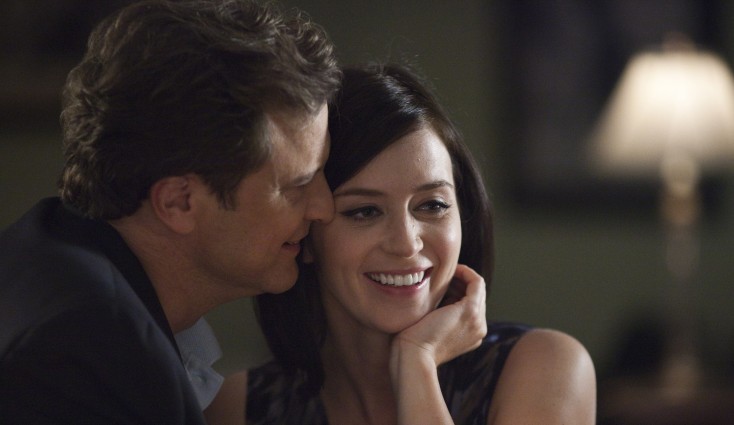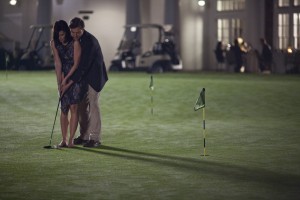By ANGELA DAWSON
Front Row Features
HOLLYWOOD—As a youngster, Emily Blunt struggled to overcome a stammer, and with a teacher’s help eventually overcame it. So it’s quite a testament that the English actress would eventually make a career out of speaking, especially as the profession requires her to play different characters with various accents.
In the romantic drama “Arthur Newman,” she is paired with fellow Brit Colin Firth, in which they both play Americans. Of course, Blunt is no stranger to American accents. She played a Yank in “Sunshine Cleaning,” “Charlie Wilson’s War,” and last year’s sci-fi epic “Looper,” with Joseph Gordon-Levitt. She also lives in America with her American husband John Krasinski.
As Mike, she plays a troubled young woman trying to escape her past who runs into Firth (playing the title character). His character has faked his death in order to erase his problems. The two end up on a road trip together from Florida to Indiana, where Newman (Firth) believes he can start fresh as a professional golf instructor. The two share some sexy scenes together as their characters share some intimate moments as they get to know each other. Directed by first time feature filmmaker Dante Ariola, “Arthur Newman” is a quirky love story about two damaged souls learning to trust and love again.
Dressed is a flouncy champagne-colored blouse and grey jeans, a very animated and sparkly Blunt spoke about her latest role and putting on an American accent once again.
Q: Both you and Colin speak with American accents in this. Did you work with the same dialect coach?
Blunt: We did, actually.
Q: Did you stay in your accents when you weren’t shooting?
Blunt: (apologetically) We didn’t, unfortunately, because we’re both Brits. Normally, when I’m shooting, I stay in the accent. When I did “Looper,” I was working with this little boy, so I would stay in the accent more so he wouldn’t get confused, but I didn’t have a chance with Colin because we’re so completely British.
Q: What were you attracted to in the script that made you want to play the offbeat character?
Blunt: The script was just completely refreshing in how original it was. It was pretty uncompromising, actually, and we didn’t want to conform to any genre that could be summed up in a one-line pitch. I like the idea of the movie that the more we mask ourselves, the freer we are able to be in ourselves. I think everyone at one point has wanted to escape or run away and take on a new identity. I don’t particularly feel these characters are necessarily crazy; they’re just acting on impulses that a lot of people have. I just couldn’t quite put my finger on why I was so drawn to the script. It’s always quite good when there is ambiguity there and something to play with.
Q: As an actress, you play different people all the time so does that mean you have less need to escape in your real life?
Blunt: As an actor, I have less need to escape because I (play other people) all the time. I go away for a few months a year and get to live this strange, insular Neverland-like experience.
Q: In the film, you and Colin’s character are heading to Indiana where he is expecting to take a job as a golf instructor. Do you play golf?
Blunt: I like playing golf but I’m terrible. I’m really bad, but I like whizzing around in the golf cart with some booze in the back. (She laughs.) That’s probably about as good as my golf gets.
Q: Do you have a favorite sport or hobby?
Blunt: I like to cook.
Q: Do you do a lot of cooking at home for John?
Blunt: Yeah. I do. (She smiles.)
Q: Any specialties?
Blunt: I’m quite good at Thai food, and we just went to Thailand, actually. I like cooking Italian food and Thai food mainly.
Q: Was it fun playing a character whose acting like she’s someone else but isn’t a very good actress?
Blunt: Well, it’s quite fun, actually, acting other parts badly. (She laughs.) It wasn’t that challenging, though, because we weren’t playing actors who were really good at taking on these personas. There was an awkwardness and a sweetness to it that was really fun.
Q: Have you ever known anyone like your character Mike?
Blunt: I grew up with someone like her.
Q: Do you think this person may recognize herself in your performance?
Blunt: No. They’ll never know because people don’t ever know themselves.
Q: Was it a friend or a relative?
Blunt: A friend.
Q: Why be friends with them? It seems like it would be really time-consuming and draining to be with someone so needy and deceptive.
Blunt: Well, I was a kid. Kids are attracted to crazy characters.
Q: Did you find Colin’s salmon-colored shirts and high-waisted pants a bit nerdy?
Blunt: Yeah, they were so lame. (She laughs.) I remember the first costume fitting he had, and he was like, “Is it really embarrassing?” and I was like, “No, it’s amazing.”
Q: There’s some ambiguity as to what happens to these characters at the end.
Blunt: I like that because I think sometimes a tidy resolution can be really unsatisfying. It’s more exciting to just not know sometimes.
Q: You and Colin have a few sex scenes where your characters are role-playing but only once do they make love as themselves. Why do you suppose that is?
Blunt: Intimacy is terrifying to both of them so they have to pretend to be other people to touch each other and be touched, and laugh with each other and do anything that resembles any kind of connection. I think Mike desperately wants to be touched; she just doesn’t know how.
Q: You recently worked with Tom Cruise on the fantasy sci-fi movie “All You Need is Kill.” What was it like working with him?
Blunt: It was fun (and) quite hardcore! I don’t think I’d ever done anything like that with the amount of training and physical duress that I had to go through. It was intense but I loved working with Tom. It was a dream. And (director) Doug Liman definitely has an unconventional approach to the genre. He’s not a conformist in any way.
Q: How did the character change over time with all the re-writes on the picture and the production starting and stopping?
Blunt: Well, (the starting and stopping) was because Tom had to do press (for “Jack Reacher”) and we had the Christmas break and everything, so we came back shortly after that. We were always due to have the break, which is good because you can edit together what you’ve got and see what you still need. It was a long process—the whole film— and I only just wrapped it really. For a movie of that scale, it was surprisingly collaborative.






